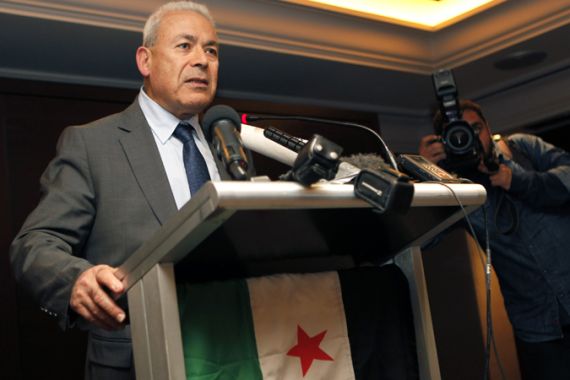Profile: Syria’s Burhan Ghalioun
Syrian National Council leader is well-regarded academic who has been a vocal critic of Assad family since late 1970s.

Syrian politician and scholar Burhan Galioun is the leader of the opposition Syrian National Council (SNC), which on Sunday became recognised by more than 70 foreign countries as the leading interlocutor of the Syrian people.
Galioun is one of the most prominent figures in the opposition, but has little experience as a politician, having worked in academia for over 30 years.
Ghalioun was born in 1945 in the Syrian city of Homs. He moved to the capital to study philosophy and sociology at the University of Damascus before leaving the country in 1969 to further his education in Paris.
By 1982, Ghalioun had doctorates, in social science and humanities, from the University of Paris VIII and from Sorbonne University.
He became well-known as a critic of the rule of Hafez Assad, the former president and father of current President Bashar al-Assad, after published a pamphlet titled “A Manifesto for Democracy” in the late 1970s.
In “Manifesto”, Ghalioun argued that state power in the Arab world had become the enemy of society and he called for the implementation of democratic reforms.
In 2000, after the current president Assad rose to power, Syria saw a brief period of political openness that was called ed “The Damascus Spring”. During this time, Ghalioun visited Syria frequently and became very active in politics.
In 2001, he told Jadaliyya Magazine that he gave a lecture in Damascus that was attended by over 700 people despite having no prior advertisement or organisation.
“[Regime officials] lost their minds; how could all these people come with no organisation?” he told the magazine.
He continued: “This scared them. It made them feel there was a strong, deep wave that may become stronger, more developed, possibly to the point of no return. They decided this was a dangerous tidal wave, and they must oppress the Damascus Spring at any price. And that’s what happened: arresting participants, closing the forums, tracking the intellectuals.”
The so-called Damascus Spring was soon cut short, and Ghalioun returned to Paris where he concentrated on his academic work.
Despite his growing role in the Syrian opposition, Ghalioun also currently the director of the Centre d’Etudes sur l’Orient Contemporain (CEOC) in Paris and a professor of political sociology at the Université de Paris III (Sorbonne Nouvelle).
SNC infighting
When Syria’s uprising against Assad began in March 2011, Ghalioun quickly sided with the protesters, making many media appearances and working to unite opposition figures.
When the SNC was established in August 2011, Ghalioun was selected to lead the wide-ranging umbrella organisation that includes opposition figures with different ideologies and backgrounds.
His six-month term as head of the SNC was renewed in February 2012 by the SNC Executive Committee in Doha, the capital of Qatar. The move was criticised by several SNC members and some decided to leave the group in protest.
Some within the opposition have berated Ghalioun for not demanding forceful measures, such as direct military intervention, form the international community to topple the Assad government.
During the Friends of Syria meeting in Istanbul on Sunday, Ghalioun called for urgent relief aid, humanitarian corridors, and material support for the opposition Free Syrian Army (FSA).
In an indication of growing co-operation between the political and armed branches of the opposition, Ghalioun said the SNC would take charge of salary payments for all members of the FSA.